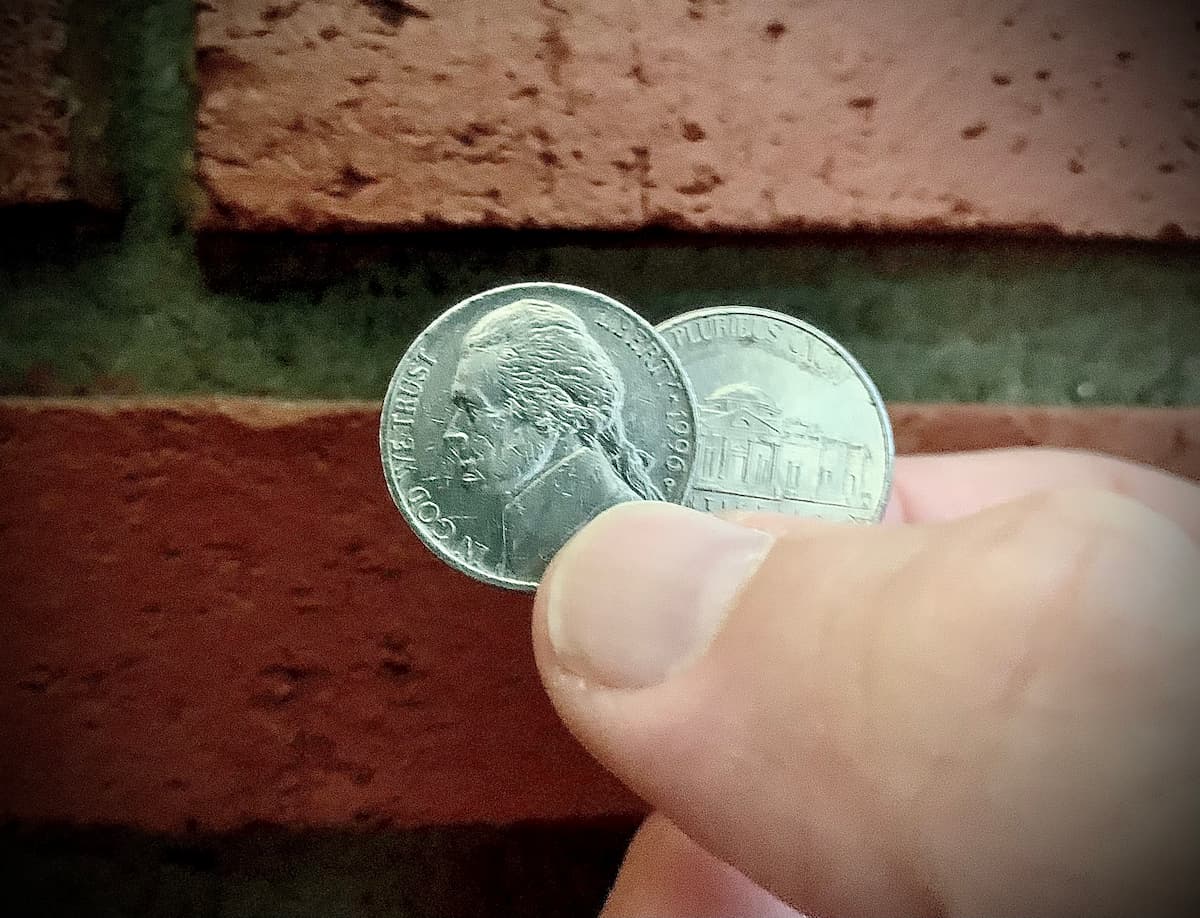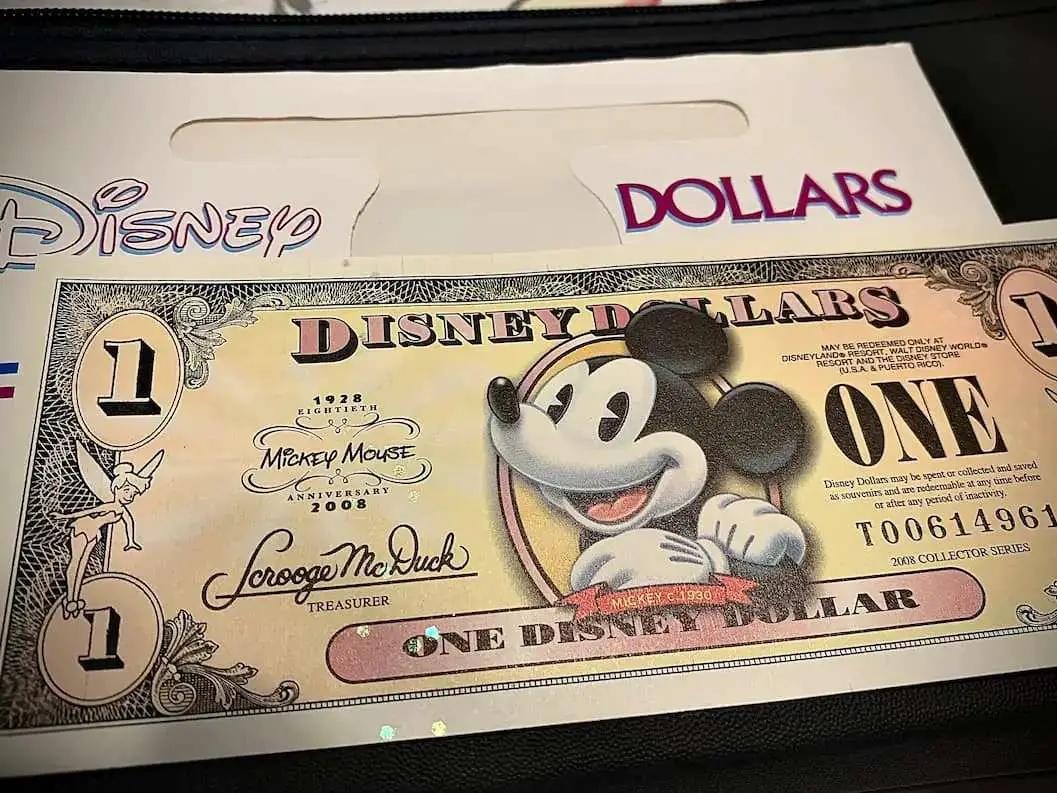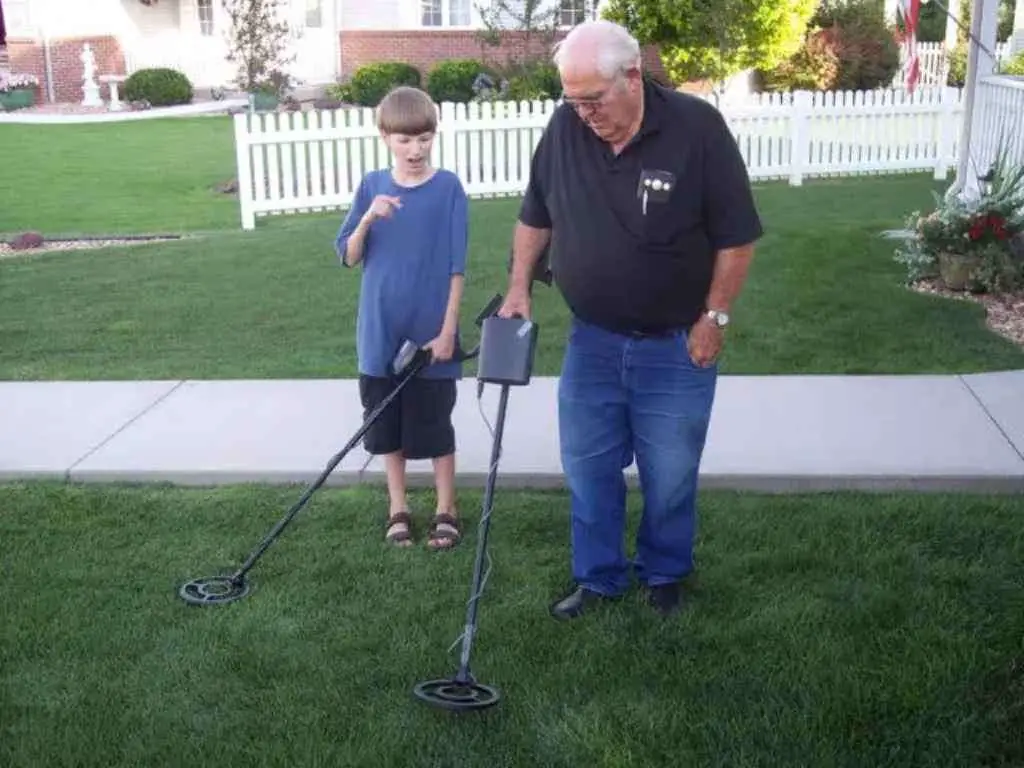A List Of Valuable U.S. Nickels Worth Money
Your chances of finding valuable nickels in everyday pocket change are pretty good — much like your odds of finding valuable pennies.
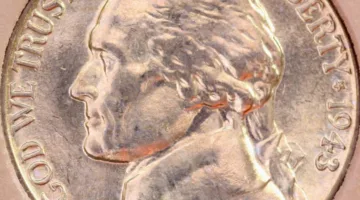
So, what are your old nickels worth?
Following are all of the U.S. nickels you should be holding onto. The nickels listed below are worth at least 2x face value… all the way up to $60 apiece!
In this article you will learn:
- Which valuable nickels are easiest to find in spare change
- All the places you should be looking for valuable nickels
- How to identify silver nickels worth money
- The 3 types of old nickels you should be saving
- Which Jefferson nickels are worth the most money
Valuable Old Nickels Are Easy To Find
Of all the denominations in circulation, nickels provide you with the best chances of finding old and valuable coins in your pocket change.
Why is that?
The Jefferson nickel has been in circulation since 1938, and it remained mostly unchanged until 2004. That’s when the Westward Journey nickels honoring the bicentennial of the Lewis and Clark expedition were released, bringing new obverse and reverse designs to the 5-cent coin.
Unlike Lincoln wheat pennies (which almost everyone knows about and saves from circulation), there are many old Jefferson nickels made in the 1930s, 1940s, and 1950s that are still in circulation simply because they look much like the newer Jefferson nickels.
Even silver wartime Jefferson “nickels” look nearly identical to regular nickels — except for one distinguishing mark that I’ll tell you about in a minute.
My Favorite Way To Find Valuable Nickels
There’s a technique I normally use when I’m looking for old nickels, and it’s called coin roll searching.
Basically, instead of relying only on spare change to look for old coins, I like to go to the local bank or nearby grocery store and ask for rolls of coins.
This puts me at an advantage — because I’ll get to look through a larger quantity of coins from a certain denomination than I might normally get to see at any one time.
If I get lucky and find any coins that I wish to keep, I can just swap those out with common pieces, and trade the roll back in for more coins to search through!
It’s really that simple. As you can see in this video:
How To Tell Silver Nickels From Regular Nickels
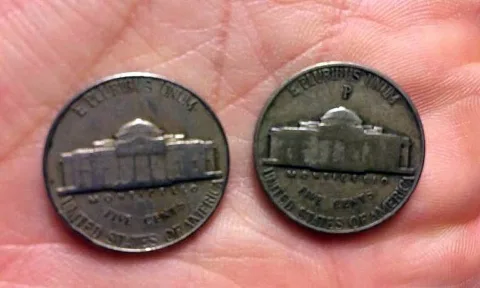
It’s really simple to tell a silver Jefferson nickel from a regular Jefferson nickel.
Silver nickels were made from 1942 through 1945 and have a large mintmark over the dome of Monticello on the reverse.
There are 3 mintmarks to look for on silver nickels:
- “P” – Philadelphia
- “D” – Denver
- “S” – San Francisco
For the record, the 1942 wartime nickel was the first U.S. coin on which a “P” mintmark was ever placed.
Not all 1942 nickels have the large mintmarks over Monticello, though.
For most of 1942, the 5-cent coin was made from nickel. However, in October of 1942 this changed — because nickel was needed to make artillery for troops in World War II.
Also worth noting… silver nickels aren’t made entirely from silver. In fact, the wartime nickel alloy consists of the following:
- 56% copper
- 35% silver
- 9% manganese
How much are silver nickels worth? I’ve got the answer to that below!
Which Old Nickels Are Worth The Most Money?
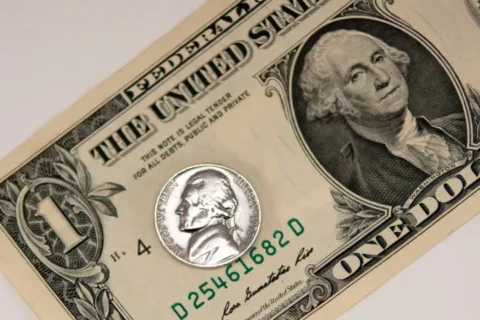
So, I know this is the part you’ve probably been waiting for — what are your old nickels worth?
Below is a list of the specific nickels you should be looking for. All are worth 10 cents or more each. Some have a value of $1 or more, and a few are even worth more than $10.
These old coins are out there in circulation, and I know this because I’ve found many of them myself in pocket change and in rolls of coins that I’ve looked through over the years.
Good luck!
These are the 3 types of nickels you should be saving:
- Liberty Head nickels – they’re worth $2 and up
- Buffalo nickels – while dateless Buffalo nickels are worth 20 cents or more each, those with dates are worth $1 and up
- Jefferson nickels made before 1960 – old Jefferson nickels made in the 1930s, 1940s, and 1950s have a value of 10 cents or more (except for the ones listed below, which have much higher values… especially those 1942-1945 silver nickels!)
Jefferson Nickels Worth More Than 10 Cents Each
All of the Jefferson nickel values listed below are for coins in average circulated condition. (Higher-grade pieces are worth more. Cleaned and damaged nickels are worth less.)
- 1938 nickel (no mintmark) – 50 cents
- 1938-D nickel – $1
- 1938-S nickel – $1.50
- 1939-S nickel – 50 cents
- 1942-D over horizontal D nickel – $1
- 1942-P nickel – $2
- 1942-S nickel – $2
- 1943-P nickel – $2
- 1943/2-P nickel – $50
- 1943-P Doubled Eye nickel – $25
- 1943-D nickel – $2
- 1943-S nickel – $2
- 1944-P nickel – $2
- 1944-D nickel – $2
- 1944-S nickel – $2
- 1945-P nickel – $2
- 1945-P Doubled Die Reverse nickel – $20
- 1945-D nickel – $2
- 1945-S nickel – $2
- 1949-D/S nickel – $60
- 1949-S nickel – 30 cents
- 1950 nickel (no mintmark) – 50 cents
- 1950-D nickel – $10
- 1951 nickel (no mintmark) – 25 cents
- 1951-D nickel – 25 cents
- 1951-S nickel – 50 cents
- 1952-D nickel – 20 cents
- 1955 nickel (no mintmark) – 25 cents
- 1955 D/S nickel – $20
- 1958 nickel (no mintmark) – 20 cents
More Info About Valuable Nickels
In addition to the links I’ve included above, here are some other resources to help you find the most valuable U.S. nickels in circulation and in collections:
- Shield Nickel Values (from 1866 to 1883)
- Liberty Nickel Values (from 1883 to 1912)
- How Much Does It Cost To Make A U.S. Nickel?
- 25 U.S. Nickels Worth $50 Apiece… Or More!
- How To Determine The Condition (Or Grade) Of Your Nickel
Next Up: Most Valuable Dimes – A List Of Silver Dimes & Other Dimes You Should Keep!
I’m the Coin Editor here at TheFunTimesGuide. My love for coins began when I was 11 years old. I primarily collect and study U.S. coins produced during the 20th century.
I’m a member of the American Numismatic Association (ANA) and the Numismatic Literary Guild (NLG) and have won multiple awards from the NLG for my work as a coin journalist. I’m also the editor at the Florida United Numismatists Club (FUN Topics magazine), and author of Images of America: The United States Mint in Philadelphia (a book that explores the colorful history of the Philadelphia Mint). I’ve contributed hundreds of articles for various coin publications including COINage, The Numismatist, Numismatic News, Coin Dealer Newsletter, Coin Values, and CoinWeek.
I’ve authored nearly 1,000 articles here at The Fun Times Guide to Coins (many of them with over 50K shares), and I welcome your coin questions in the comments below!


